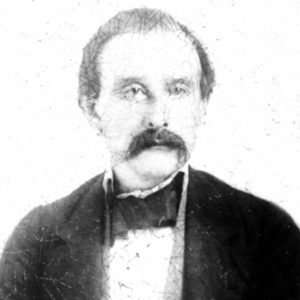calsfoundation@cals.org
Jacob Barkman (1784–1852)
Jacob Barkman is known as the father of Clark County. An early settler along the Caddo River, Barkman eventually became a prominent landowner and planter.
Jacob Barkman was born on December 20, 1784, in Kentucky. Little is known of his early life, but, by 1811, Barkman had married Rebecca Davis. Eventually, the couple had two sons and a daughter. Wishing to move west, the family joined Barkman’s brother John, John’s wife, and their several slaves at Bayou Sara in Louisiana in 1811. Joining another group organized by John Hemphill, the party moved up the Ouachita River. The Barkmans settled along the Caddo River, just a few miles from its merger with the Ouachita. This location was a few miles to the northwest of Blakelytown, which was renamed Arkadelphia (Clark County) in the 1830s. John Barkman moved to the southwest and settled near present-day Texarkana (Miller County).
After clearing an area to grow crops, Barkman began construction on his home in 1815. Using sun-dried bricks, he built the house two stories high with a separate kitchen. Located almost on the bank of the Caddo, the house was near an Indian mound and faced the Southwest Trail. The size of the house and its location led it to being used as the first courthouse when Clark County was formed by the Missouri Territorial Legislature in 1818. It continued to serve as the courthouse until 1825, and a nearby smokehouse occasionally served as a jail.
Appointed as a magistrate in 1820, Barkman continued to focus on building his land holdings while serving his community. On December 5, 1823, he officially took title of 800 acres in modern Clark County. By the time of his death, he held approximately 22,000 acres, which included all of the land between his home and Arkadelphia. Barkman had other businesses outside of planting. In 1815, he transported a cargo of cotton, pelts, and other materials to New Orleans, Louisiana, and returned with supplies for his household and to sell at the store he constructed along the Ouachita. The entire trip took around six months.
In 1820, the Barkman home became the first post office in the county, and Barkman served as the postmaster. The same year, he served in the territorial legislature and later served as the president of the Senate. By 1831, the Barkman home had become a stagecoach stop. The Kentucky native also introduced a new sport to Clark County, using the large field in front of his home to hold horse races, while spectators sat on the nearby Indian mound.
Continuing to build his businesses, Barkman constructed a small sidewheel steamboat in the early 1830s. Named the Dime for its small size, the boat allowed Barkman to ship his crops and other goods down the Mississippi River much more quickly than he had on his first trip in 1815. Barkman also constructed the first textile mill in the state in 1848 on an island in the Caddo River. The structure was destroyed in a flood soon after completion, and Barkman did not rebuild it. Salt was an important business in early Clark County, and Barkman operated several salt works along the Ouachita.
Rebecca Barkman died in 1837, and Jacob remarried a few months later; his new wife was many years his junior. He continued to operate his businesses and continued to purchase more land. Barkman died after an illness on August 24, 1852. He was originally buried near his home along the Caddo, but his grandson moved his remains to Rose Hill Cemetery in 1899. The Barkman house was destroyed soon after Jacob Barkman’s death.
Barkman’s daughter-in-law eventually sold part of the property to the founders of Arkadelphia Methodist College (now Henderson State University—HSU), which built a campus on the former cotton field. HSU continues to operate at that location.
For additional information:
“Clark County: Early Times to 1842.” Clark County Historical Journal 1 (Winter 1973): 10–18.
Halliburton, W. H. “Progressive Pioneer.” Arkansas Gazette Sunday Magazine, October 24, 1937, pp. 1, 13.
Hall, John. Henderson State College: The Methodist Years, 1890–1929. Arkadelphia, AR: Henderson State College Alumni Association, 1974.
Newberry, Farrar. “Jacob Barkman.” Arkansas Historical Quarterly 19 (Winter 1960): 314–324.
Richter, Wendy, ed. Clark County, Arkansas: Past and Present. Arkadelphia, AR: Clark County Historical Association, 1992.
David Sesser
Henderson State University
 Business, Commerce, and Industry
Business, Commerce, and Industry Louisiana Purchase through Early Statehood, 1803 through 1860
Louisiana Purchase through Early Statehood, 1803 through 1860 Jacob Barkman
Jacob Barkman 




I have just learned that Jacob Barkman is my great-great-great grandfather. My grandmother is Pearl Barkman Andrews.